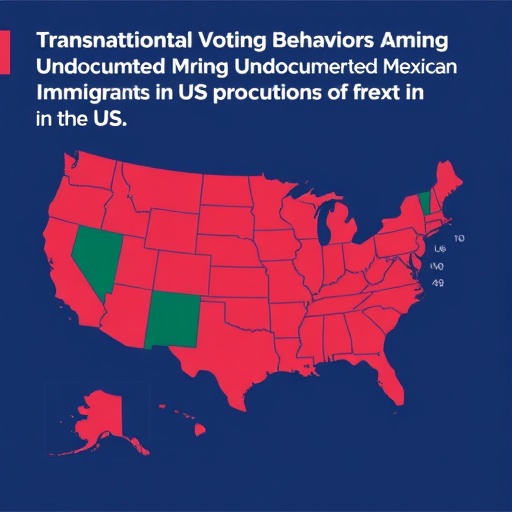In an era marked by unprecedented migration flows, the political engagement of immigrants—particularly those undocumented—has emerged as a complex and understudied phenomenon. Globally, around 3.6% of people live outside their birth countries, prompting an expansion of voting rights for expatriates in many nations. Yet, while extensive research has examined the legal extension of voting rights abroad, far fewer studies have empirically analyzed the extent to which these rights are exercised, especially among vulnerable groups such as undocumented immigrants. A recent groundbreaking study from Japan’s Waseda University tackles this research gap through an innovative methodological lens, revealing new dimensions of political participation by undocumented Mexican immigrants residing in the United States.
Traditional survey methodologies have notoriously failed to capture reliably the attitudes and behaviors of undocumented populations, due primarily to the lack of sampling frames and the inherent challenges of accessing individuals who often live “under the radar.” To overcome these obstacles, Associate Professor Yuriko Takahashi and her colleagues devised a survey using respondent-driven sampling (RDS), a technique designed to generate representative data from hard-to-reach communities by leveraging their internal social networks. By conducting a large-scale RDS-based survey in Illinois in 2023 with over 500 respondents, the researchers were able to obtain an unprecedented insight into the electoral engagement of undocumented Mexican immigrants with Mexico’s external voting system.
This study stands out not only for its novel methodological approach but also for the nuanced findings it illuminates regarding the complex interplay of informational, educational, and trust factors influencing transnational political participation. The research indicates that undocumented immigrants who receive electoral information primarily through official public organizations are significantly more likely to obtain voter credentials and participate in votes abroad than those informed mainly by family or mass media sources. This disparity underscores the crucial role of credible and direct communication channels in fostering electoral participation among marginalized migrant groups.
Education emerged as another critical determinant. Higher educational attainment among respondents was consistently associated with increased likelihood of completing voter registration and casting ballots. This correlation suggests that educational institutions potentially serve as foundational platforms that equip immigrants with the civic knowledge and confidence needed to navigate political systems both domestically and transnationally. Conversely, lower educational levels correlated with reduced political involvement, signaling a pressing need for targeted educational outreach to bolster immigrant electoral inclusion.
Trust dynamics also revealed fascinating complexities in political behavior. While trust in the Mexican government positively influenced voter registration efforts, it did not significantly predict actual voting, indicating that institutional distrust may dampen political efficacy at particular stages of engagement. Intriguingly, trust in the US government positively correlated with higher external electoral participation, which may reflect immigrants’ broader political confidence derived from their lived experiences in the United States. Moreover, higher external political efficacy—believing one’s vote can influence outcomes—was linked paradoxically to increased interest in registration but decreased voter turnout, suggesting a multifaceted psychological relationship between perceived political power and actual voting behavior in diaspora communities.
The study’s data collection process was meticulous and iterative. Initial phases included in-depth qualitative interviews with Mexican community leaders across major US cities between 2020 and 2021. These interviews were followed by focus groups held in metropolitan hubs like Chicago and Los Angeles. Insights from these methods informed the comprehensive design of the RDS survey, enhancing its cultural sensitivity and conceptual validity. Such a rigorous preliminary groundwork is especially vital when engaging populations characterized by distrust and legal invisibility.
These findings have profound implications for countries with substantial emigrant populations, such as Mexico, which has recently expanded overseas voting rights. By delineating the barriers and facilitators of electoral registration and participation, this research offers substantive guidance to policymakers seeking to empower expatriate communities effectively. Ensuring access to accurate electoral information through public avenues, promoting educational opportunities, and rebuilding institutional trust could collectively enhance political participation and democratic representation among migrants abroad.
Beyond Mexico, this work resonates internationally in an era where diaspora communities increasingly influence homeland politics, remittances, and bilateral relations. Undocumented immigrants, though politically marginalized in their host countries, navigate dual identities and political spheres, wielding potential influence through transnational voting and advocacy. This study underscores the necessity of recognizing and including these hard-to-reach voices in political analyses to foster more inclusive and representative democracies.
From a methodological perspective, the successful application of respondent-driven sampling represents a significant advancement in social science research. By enabling the formation of representative samples without traditional sampling frames, RDS mitigates selection biases that have long impeded the study of hidden or stigmatized populations. As such, this approach has promising potential for broader adoption in migration studies, public health, and social policy research, where similar challenges of attrition and inaccessibility prevail.
Associate Professor Takahashi emphasizes that these insights not only illuminate immigrant political behavior but also highlight the broader socio-political transformations driven by migration in the 21st century. As emigrant groups reshape political landscapes in both host and origin countries, understanding their political attitudes, motivations, and constraints remains critical for anticipating future demographic and ideological shifts globally.
In sum, this pioneering investigation into the transnational political participation of undocumented Mexican immigrants in the US furnishes robust empirical evidence and methodological innovation, addressing a critical void in migration and political science research. Its findings serve as a clarion call for more inclusive political engagement frameworks that acknowledge the complex realities of immigrant populations navigating multiple national jurisdictions and identities.
Subject of Research: People
Article Title: Transnational Political Participation of Undocumented Mexican Immigrants in the US: Respondent-Driven Sampling with the Hard-to-Reach Population
News Publication Date: 5-Sep-2025
Web References:
https://www.cambridge.org/core/journals/journal-of-race-ethnicity-and-politics/article/transnational-political-participation-of-undocumented-mexican-immigrants-in-the-us-respondentdriven-sampling-with-the-hardtoreach-population/25F3F10D14F9C27221F3869A2B7863E1
References:
DOI: 10.1017/rep.2025.10018
Image Credits:
Associate Professor Yuriko Takahashi from Waseda University, Japan
Keywords: Political science, Economics, Government, Sociopolitical systems, Social issues




